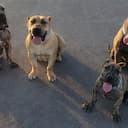Origins and Temperament
The Pitt Bull Terrier has a storied heritage, initially bred in England for bull-baiting and later as farming dogs and family companions upon their arrival in America. Known for their courage and strength, they exude a gentle disposition and fierce loyalty towards their owners. These dogs can be incredibly affectionate and people-oriented, making them sensitive to separation. Their travel needs must, therefore, consider their desire for human interaction and their need for a consistent presence to feel secure.
Size and Physical Needs
Typically, Pitt Bull Terriers range from 30 to 85 pounds, with a robust and muscular build. Known for their vitality, they require regular exercise and mental stimulation. During transportation, ample room to move and a comfortable area to rest is essential. Given their muscular frame, ensuring a stable base during travel prevents undue strain or injury.
Common Health Considerations
Pitt Bull Terriers may experience genetic health conditions like hip dysplasia, skin allergies, and heart disease. When scheduling transportation, confirm accurate health documentation per travel regulations and perform any preventative health measures such as flea and tick medication. It's key to provide your carrier with current health records and a clear understanding of your Pitt Bull Terrier's specific needs.
















